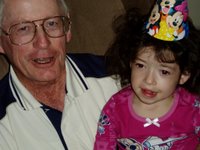 Talking about death with children is never easy
Talking about death with children is never easyMy father-in-law passed away in early January after an eight-month-long battle with pancreatic cancer. Most people know this type of cancer is one of the worst and that survival rates are less than 3 percent.
From the beginning, we knew my father-in-law's prognosis was not an optimistic one. My husband and I talked a lot about the treatments his father pursued to prolong his life, how his death would affect my mother-in-law, and even ways we could spend more time together with them.
Our goal: Make memories so our children would remember their grandfather, "Vuvu," after he was gone.
In the last year, we took a lot more trips to the Bay Area. Some of these visits were for family gatherings, but many were to see Vuvu in the hospital or skilled nursing facility.
A hospital can be a confusing place for a 4 year-old girl and a dangerous place for a carefree toddler oblivious to the fragility of IV stands and intricate mesh of cables. And yet we persevered.
My husband and I would take turns caring for Berkeley, while Barcelona sometimes sat on the hospital bed to give her Vuvu hugs. When Vuvu was able to get out of bed, the children would take short walks around the hospital ward with their grandfather, holding his hands and keeping him company.
Almost always after our visits, Barcelona would ask why Vuvu was in the hospital and always we kept our answer simple.
"Vuvu is sick, honey, the doctors are trying to help him feel better," we would say. We did not use words like "cancer" or "dying," I think we were too scared to.
After Christmas, my father-in-law's bad days started to outnumber his good ones. My husband spent most of his time in the Bay Area and when possible I took the kids on day trips to see their Vuvu.
The last visit was a bittersweet one. My father-in-law had decided the day before to cease all treatment and enter into hospice. By the time we arrived the following afternoon, he was sleeping and difficult to wake. When he did open his eyes briefly, I held Barcelona over his bed while she softly told him, "I love you."
I believe I saw the corner of Vuvu's mouth turned up a little at the sight of his granddaughter, that he could see her, hear her voice.
A short two days later, when my husband called to tell me Vuvu had died, I felt a tremendous sadness wash over me. I did not tell Barcelona right away, but instead held onto my grief like a precious secret.
I was not sure how to explain death to a 4 year old, so I called her preschool teacher who kindly loaned me some children's books from the school's library. After reading them, I decided they were too complex for my little one, but they gave me an idea what to tell her.
When my husband came home, the three of us worked together on a photo essay for the memorial service planned a few days later. We talked to Barcelona about Vuvu while we arranged and taped pictures of him as a boy, with his sons, and of his world travels to the tri-fold display board. Later, after we put Berkeley to bed that night, my husband and I sat down to talk with our daughter.
"Sometimes, when people get sick, they can't get better and their body dies," I told her.
"Like my gold fish?" my daughter asked.
"Yes," I said. "You know Vuvu was sick for a long time and he couldn't get better. Vuvu's body has died and he has gone to heaven to live with God and the angels."
"Because he was sick?"
"Yes."
"But what about Berkeley? He's sick," she said, referring to her little brother's recent cold.
The next few minutes were spent reassuring Barcelona that Berkeley was not sick the same way Vuvu had been. Finally, she seemed satisfied with our explanations.
"Vuvu's body died and he went to live with the angels," she said. "But I want to see the angels. I like angels."
Together we hugged our daughter with tears in our eyes. We embraced her sweet innocence. Neither of us, I think, wanted to let go.
Mommy Time Column ~ March 2006
***
I recommend the book "Remember the Butterflies" by Anna Grossnickle Hines when talking about death of a loved one with children.
No comments:
Post a Comment